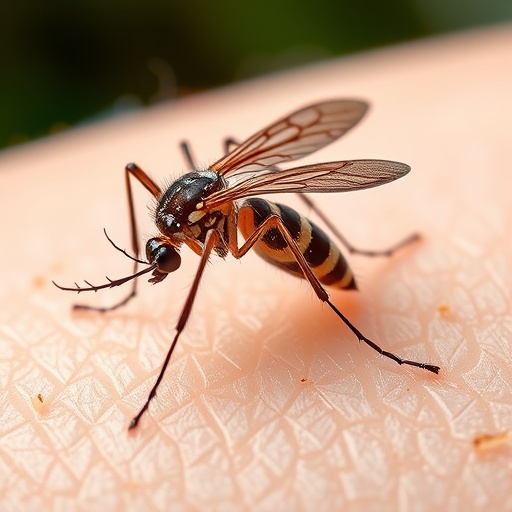In a breakthrough study that could reshape the fight against dengue fever, researchers have uncovered a crucial genetic determinant governing the susceptibility of Aedes aegypti mosquitoes to dengue virus infection. This new insight revolves around natural variants in the promoter region of cytochrome P450 genes, a diverse family of enzymes traditionally known for their role in metabolic detoxification. This discovery, published in Nature Communications, holds substantial promise for novel vector control strategies that target the mosquito’s genetic makeup rather than the virus itself, potentially opening avenues for curbing one of the most pervasive mosquito-borne diseases worldwide.
Dengue virus, transmitted primarily by Aedes aegypti, remains a significant challenge to global health, affecting millions annually with potential severe outcomes such as dengue hemorrhagic fever and dengue shock syndrome. Traditional vector control methods, including insecticides and habitat elimination, have struggled to keep pace with expanding mosquito populations and viral spread. Against this backdrop, the report by Merkling, Couderc, Crist, and colleagues provides a molecular glimpse into how natural genetic variation within mosquito populations modulates their capacity to harbor and transmit the virus, essentially influencing epidemic dynamics at the population level.
.adsslot_Zy43SmjaNL{width:728px !important;height:90px !important;}
@media(max-width:1199px){ .adsslot_Zy43SmjaNL{width:468px !important;height:60px !important;}
}
@media(max-width:767px){ .adsslot_Zy43SmjaNL{width:320px !important;height:50px !important;}
}
ADVERTISEMENT
Employing a combination of genomic sequencing, functional assays, and viral challenge experiments, the researchers systematically mapped the variation in the promoter regions across geographically distinct Aedes aegypti populations. They identified distinct allelic variants correlating with differential expression of cytochrome P450 genes that corresponded meaningfully with varying degrees of dengue virus susceptibility. This approach underscores the importance of integrating population genomics with pathogen biology to unravel complex vector-host interactions that dictate transmission efficiency.
Interestingly, the study demonstrates that promoter variants do not act in isolation but appear to interplay with the mosquito’s immune pathways and metabolic networks. The modulation of cytochrome P450 gene expression influences oxidative stress responses and other biochemical pathways that can either inhibit or promote viral replication within various tissues. This complexity highlights a multifaceted genetic architecture wherein host factors beyond canonical immune genes are pivotal in determining vector competence.
These findings challenge the conventional focus on immune-related genes as primary modulators of arboviral susceptibility, suggesting that metabolic genes and their regulatory elements can be equally influential. Moreover, the promoter variants studied are naturally occurring within wild mosquito populations, meaning that this genetic diversity is a preexisting substrate upon which environmental pressures and viral evolution can act, shaping transmission dynamics in real-world settings.
From an applied perspective, the identification of cytochrome P450 promoter variants as susceptibility loci opens novel possibilities for genetic interventions. Techniques such as gene editing or gene drive mechanisms could target these regulatory regions to engineer mosquito populations with reduced competence for dengue viruses. Such strategies might complement or even supersede existing vector control methods, providing a more sustainable and targeted approach to mitigate dengue transmission.
Furthermore, understanding the interplay between detoxification pathways and viral susceptibility raises important considerations regarding the use of insecticides. Selection pressures imposed by chemical control could inadvertently influence promoter variant frequencies, potentially enhancing or diminishing mosquito susceptibility to the virus. Therefore, this study calls for a nuanced assessment of vector control programs in light of mosquito genetics to avoid unintended consequences that might exacerbate pathogen spread.
The research also delves into the mechanistic underpinnings of how cytochrome P450 enzymes influence viral infection at a cellular level. Experimental data suggest that altered enzyme levels impact cellular redox states, lipid metabolism, and membrane composition, all of which can affect dengue virus entry, replication, and assembly. These biochemical changes create microenvironments either conducive or hostile to viral propagation, providing mechanistic links between genotype and phenotype.
Moreover, the study adopts a multidisciplinary strategy—blending molecular genetics, virology, biochemistry, and ecology—to paint a comprehensive picture of vector-virus interactions. Such integrative approaches are crucial since vector competence is a polygenic trait influenced by environmental factors and gene-environment interactions. The insight that promoter variants can act as genetic switches modulating susceptibility invites reexamination of previous assumptions that primarily focused on coding sequences and immune genes.
The global significance of this work is underscored by the widespread distribution of Aedes aegypti and the increasing burden of dengue globally, exacerbated by climate change, urbanization, and globalization. Identification of genetic factors that govern viral susceptibility provides policymakers and public health professionals with new molecular markers for surveillance and risk assessment, enabling precision targeting of control efforts in regions with high transmission potential.
In the broader context of arbovirus research, these findings may stimulate analogous investigations into other vector species and pathogens, expanding our understanding of vector competence determinants. The notion that promoter variation within metabolic gene families can influence pathogen susceptibility could be a generalizable principle, advancing the field towards more sophisticated models predicting disease emergence and spread.
Finally, this research exemplifies the power of genomics and molecular biology in tackling pressing global health challenges. By elucidating intricate genetic mechanisms underlying mosquito-virus interactions, it paves the way towards innovative, genetics-informed strategies for vector management. As the fight against dengue and related diseases intensifies, such foundational knowledge will be indispensable for developing the next generation of interventions that are both effective and ecologically sound.
Subject of Research: Dengue virus susceptibility mechanisms in Aedes aegypti mosquitoes linked to cytochrome P450 promoter genetic variation.
Article Title: Dengue virus susceptibility in Aedes aegypti linked to natural cytochrome P450 promoter variants.
Article References:
Merkling, S.H., Couderc, E., Crist, A.B. et al. Dengue virus susceptibility in Aedes aegypti linked to natural cytochrome P450 promoter variants. Nat Commun 16, 7468 (2025). https://doi.org/10.1038/s41467-025-62693-y
Image Credits: AI Generated
Tags: Aedes aegypti dengue susceptibilityCytochrome P450 enzymesdengue hemorrhagic feverdengue virus transmissionepidemic dynamics of denguegenetic determinants of denguegenetic variation in insect populationsmetabolic detoxification in mosquitoesmosquito-borne diseasesNatural P450 variantsnovel approaches to disease managementvector control strategies





